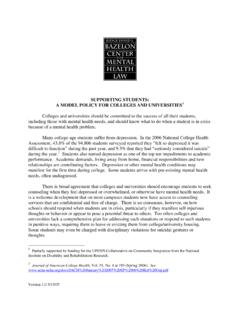Transcription of Supporting Student Success (S3) - hoiunitedway.org
1 Supporting Student Success (S3) March, 2018 Newsletter Volume 3, Number 7 In this issue: From the coordinator Featured School Research on Anxiety From the S3 Coordinator I have been starting to get inquiries about S3 for next school year. Once information is available I will pass it along to you as soon as possible. One thing I do know is that S3 applications for next year are slated to be done online. Of course explicit instructions will be provided to you, and if you want one to one assistance regarding operation of the online program, that will also be available.
2 As always if you would like any help with determining your needs or matching efforts with needs for next year, please feel free to contact me. There will be more information in April. I will continue to make visits until the middle of May. If you haven t had a second semester visit, I will contact you after spring vacation. Thank you. Featured School Pleasant Valley middle school, in addition to implementing ongoing anti-bullying efforts this year, is implementing whole classroom SEL instruction in a free curriculum resource called, Emotional Intelligence Activities for Teens.
3 There are resources for pre-teens as well. Based on Daniel Goleman s highly acclaimed book, Emotional Intelligence, activities are centered on the following social-emotional areas: intrapersonal, interpersonal, adaptability, stress-management, and general mood. Interestingly enough, the source to obtain the activities is the Ohio National Guard. The S3 counselor who is teaching the program to fifth graders is very positive about how it s working and how it is being received by both teachers and students . The link to the teenage curriculum is: The link to the pre-teen curriculum is: Research on Anxiety As mentioned in other newsletters, the four main conditions that are seen by S3 counselors continue to be: stress, anxiety, anger and depression.
4 A major behavior leading from these conditions is a lack of self-regulation. These newsletters have focused somewhat on stress and self-regulation, but never specifically on anxiety. S3 efforts have included providing curriculum for counselors to conduct small groups deal with anxiety and also materials for a school within a school setting specifically for students with anxiety issues. Anxiety can mask itself as other conditions: anger, physical illness, ADHD or even a learning disorder. According to the Child Mind Institute, Anxiety tends to lock up the brain, making school hard for anxious kids.
5 Children can struggle with: Separation anxiety: When children are worried about being separated from caregivers. These kids can have a hard time at school drop-offs and throughout the day. Social anxiety: When children are excessively self-conscious, making it difficult for them to participate in class and socialize with peers. Selective mutism: When children have a hard time speaking in some settings, like at school around the teacher. Generalized anxiety: When children worry about a wide variety of everyday things. Kids with generalized anxiety often worry particularly about school performance and can struggle with perfectionism.
6 Obsessive-compulsive disorder: When children s minds are filled with unwanted and stressful thoughts. Kids with OCD try to alleviate their anxiety by performing compulsive rituals like counting or washing their hands. Specific phobias: When children have an excessive and irrational fear of particular things, like being afraid of animals or storms. This very informative article can be found at: In addition to discussing the symptoms and classroom manifestations, the article also links to tips from Clark Goldstein, Phd, on how to help anxious students how to respect feelings without empowering fears.
7 That s all for now. Have a relaxing and fun spring vacation! Jan Stress and Video Games As mentioned above, the effects of students playing violent video games appear to be showing up as aggressive behavior in classrooms, playgrounds and on buses. In work to address the question, published in the journal JAMA Pediatrics, scientists led by Craig Anderson, director of the center for the study of violence at Iowa State University, found hints that violent video games may set kids up to react in more hostile and violent ways. What their study did is show that it s media violence exposure that is teaching children and adolescents to see the world in a more aggressive kind of way, says Anderson.
8 It shows very strongly that repeated exposure to violent video games can increase aggression by increasing aggressive thinking. To read about the study and also how playing violent video games affects the brain, please go to: All for now, peace, Jan









